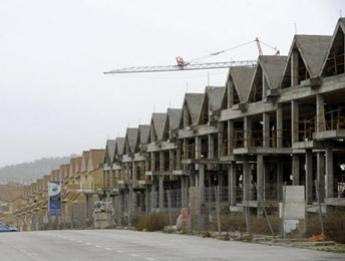Standard & Poor's (S&P) says European house prices are likely to drop further in 2010 as prices continue to adjust in the wake of a severe recession. The credit ratings agency believes the British market could stabilise by the end of this year. AFP - European house prices sinking in the global economic crisis are likely to fall further next year although the British market may steady, a study said on Wednesday.
The report by credit ratings agency Standard & Poor's (S&P) estimated that British house prices may "stabilise" in the last three months of this year.
This may leave them at about seven percent below the level in December last year, and they may remain "roughly stable" in 2010.
Prices in Ireland would fall 13 percent this year and a further 10 percent in 2010.
"The Spanish housing market is poised for an extended period of adjustment, with prices declining until 2012," it said.And in France, prices "will drop by about 10 percent in 2009, and by two percent in 2010."
The agency said that "given the magnitude of past increases on one hand, and the severity of the current economic recession on the other", many people were wondering how much longer the downward correction of prices would last.
The agency's chief economist for Europe, Jean-Michel Six, said: "Since the beginning of the current downturn in mid-2007, price declines have been much steeper than in the 1980s-1990s."
This pointed to two possible outcomes, he said: a fall lasting "four to five years -- and leading to a dramatic cumulative price fall", or a much quicker correction given the speed of price falls so far.
House prices had fallen far more quickly than during previous downturns and this had brought about a sharp lowering of the cost of homes relative to incomes: affordability had improved rapidly.
On this measure, the price fall could "reach its end in the next year or so."
But the crisis was caused in part by excessive debt taken on by households and companies, and the correction of this factor would take time.
However, the level of household debt differed from country to country and was "much higher in Spain and in the UK than in France or Italy", suggesting that the housing downturn might last longest in highly leveraged countries.
The report by credit ratings agency Standard & Poor's (S&P) estimated that British house prices may "stabilise" in the last three months of this year.
This may leave them at about seven percent below the level in December last year, and they may remain "roughly stable" in 2010.
Prices in Ireland would fall 13 percent this year and a further 10 percent in 2010.
"The Spanish housing market is poised for an extended period of adjustment, with prices declining until 2012," it said.And in France, prices "will drop by about 10 percent in 2009, and by two percent in 2010."
The agency said that "given the magnitude of past increases on one hand, and the severity of the current economic recession on the other", many people were wondering how much longer the downward correction of prices would last.
The agency's chief economist for Europe, Jean-Michel Six, said: "Since the beginning of the current downturn in mid-2007, price declines have been much steeper than in the 1980s-1990s."
This pointed to two possible outcomes, he said: a fall lasting "four to five years -- and leading to a dramatic cumulative price fall", or a much quicker correction given the speed of price falls so far.
House prices had fallen far more quickly than during previous downturns and this had brought about a sharp lowering of the cost of homes relative to incomes: affordability had improved rapidly.
On this measure, the price fall could "reach its end in the next year or so."
But the crisis was caused in part by excessive debt taken on by households and companies, and the correction of this factor would take time.
However, the level of household debt differed from country to country and was "much higher in Spain and in the UK than in France or Italy", suggesting that the housing downturn might last longest in highly leveraged countries.

 forecasts further drop for European house prices
forecasts further drop for European house prices

No comments:
Post a Comment